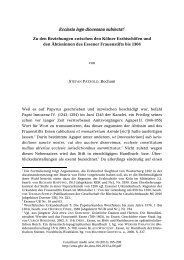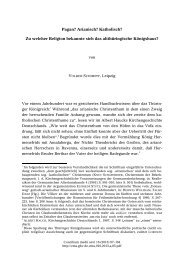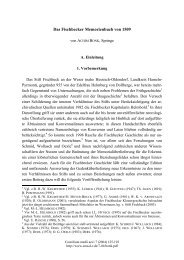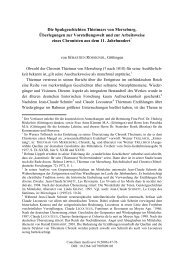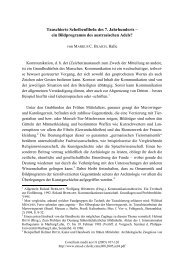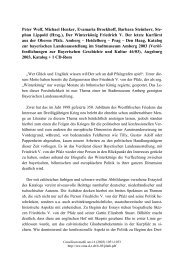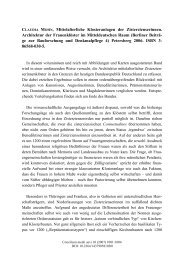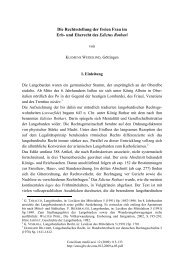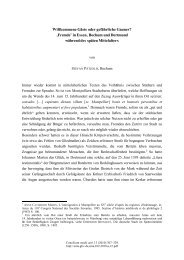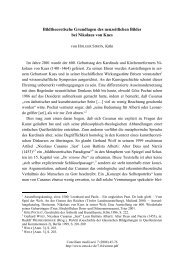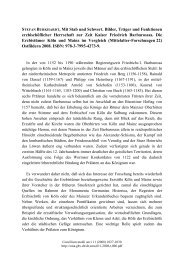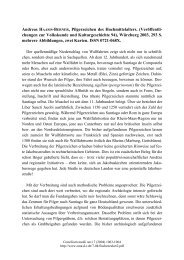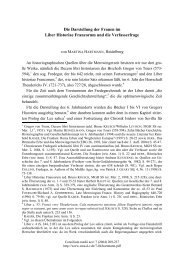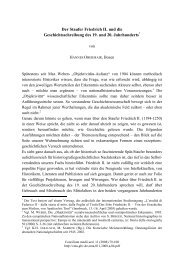Rabanus Maurus - Concilium medii aevi
Rabanus Maurus - Concilium medii aevi
Rabanus Maurus - Concilium medii aevi
You also want an ePaper? Increase the reach of your titles
YUMPU automatically turns print PDFs into web optimized ePapers that Google loves.
2<br />
FEE-ALEXANDRA HAASE: Rhetoric as praise of the emperor<br />
was removed from place to place according to the change of the royal residence. In<br />
786 and again 790-793 Alcuin returned to England. Alcuin remained in France from<br />
the summer of 793 until his death, May 19, 804. Alcuin was an educator, scholar, and<br />
theologian. Alcuin’s educational writings are the treatises On Grammar, On<br />
Orthography, On Rhetoric and the Virtues, On Dialectics and the Disputation with<br />
Pepin. 1 In other words: The educational works consist of works dedicated for the<br />
trivium like De grammatica, De dialectica, De rhetorica and a fragment concerning<br />
music, De orthographia and the dialogue Disputatio Pippini cum Albino scholastico.<br />
The writings of Priscian, Donatus, Isidorus and Beda for grammar, of Cicero for<br />
rhetoric and from Augustine for dialectics were used by Alcuin. The language of<br />
Carolingian culture for the church and bureaucracy was Latin. For most people in<br />
Europe after the ‘barbarian invasions’ Latin was a foreign language. Charlemagne<br />
encouraged literacy in Latin, his own clergy being helped in this work by Anglo-Saxon<br />
and Irish monks, who had already had to develop methods of teaching Latin as a<br />
second language. Carolingian scholars made the copies of the Latin classics, which the<br />
humanists later discovered.<br />
According to Einhard (Eginhard), the Disputationes, and Alcuin’s correspondence,<br />
Charlemagne listened to his Anglo-Saxon advisor in all matters not political.<br />
Charlemagne’s Admonitio generalis stressed the importance of education. The<br />
academic scholars working at his court developed a concept based upon the ancient<br />
artes liberales. Among the clergy many of them were barely literate. Monks who spent<br />
their days copying manuscripts could barely read or understand them. Charlemagne<br />
wanted unity in the Frankish Church under his supervision. By this time the state<br />
needed the monastery schools to teach civic lessons in addition to Christian coverage.<br />
Einhard writes in the Vita Karoli Magni that eloquence was to be expressed in foreign<br />
languages and Charlemagne learned Greek and Latin:<br />
[25] Erat eloquentia copiosus et exuberans poteratque quicquid vellet apertissime<br />
exprimere. Nec patrio tantum sermone contentus, etiam peregrinis linguis ediscendis<br />
operam impendit. In quibus Latinam ita didicit, ut aeque illa ac patria lingua orare sit<br />
solitus, Grecam vero melius intellegere quam pronuntiare poterat. Adeo quidem<br />
facundus erat, ut etiam dicaculus appareret. 2<br />
1 http://www.newadvent.org/cathen/01276a.htm. [5.8.2002]<br />
2 http://www.gmu.edu/departments/fld/CLASSICS/ein.html#25. [3.9.2003]



